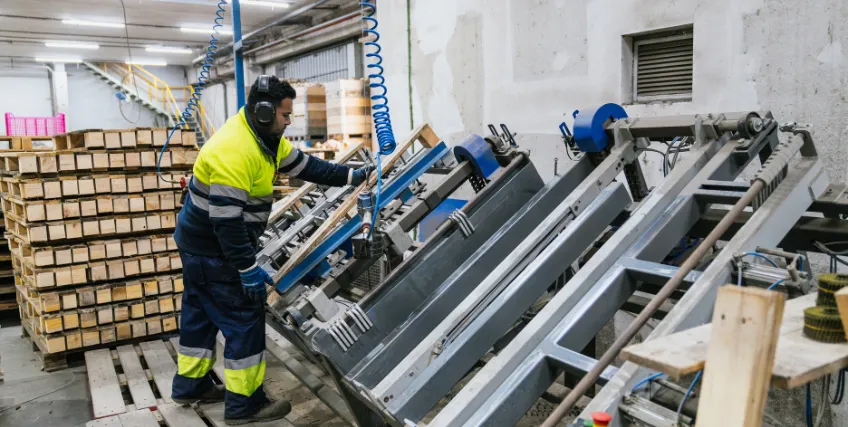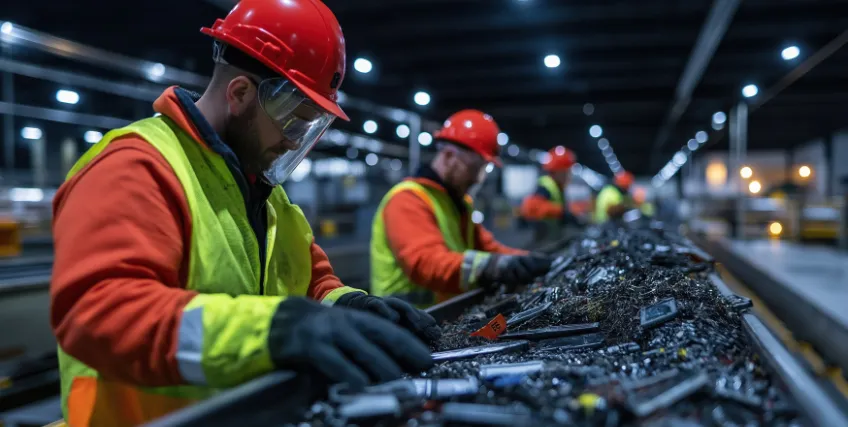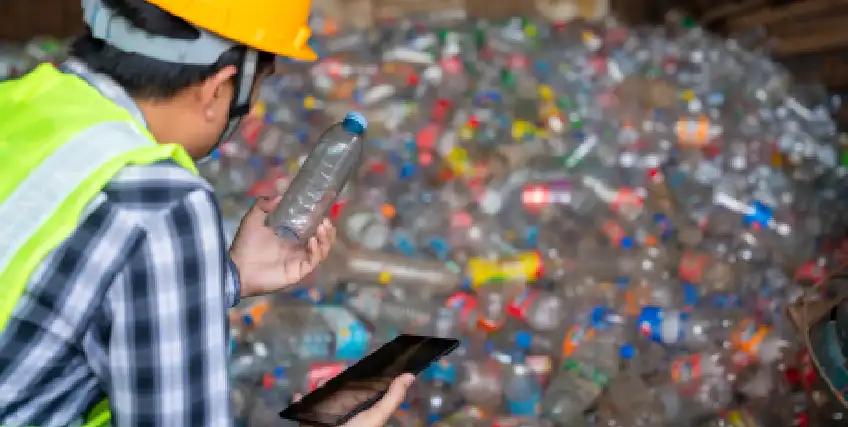Power Your Green Mission
With Reliable Recycling Business Funding
Looking for Business Financing?
Apply now for flexible business financing. Biz2Credit offers term loans, revenue-based financing, lines of credit, and commercial real estate loans to qualified businesses.
Set up a Biz2Credit account and apply for business financing
Across the U.S., recycling businesses are playing a major role in building a circular economy. From e-waste to food scraps, materials once bound for the landfill are now seen as valuable resources. But starting or growing a recycling operation takes more than environmental passion; it takes capital. That's where recycling business funding, also known as loans for recycling business, becomes essential.
Whether you're setting up composting stations or expanding a materials recovery facility, you need access to reliable funding. This sector also includes start-ups innovating in reuse, waste reduction, and sustainability. As landfill space shrinks and demand for recyclable materials increases, there's a growing opportunity for recycling-focused businesses.
The Environmental Protection Agency (EPA) supports the development of sustainable materials management programs, showing how important this sector is to public health and the economy.
But securing recycling business funding isn’t always straightforward. Owners must navigate public grants, private loans, and state-supported programs. Some businesses also partner with municipalities or nonprofit organizations to fund new initiatives.
From loans and grant funding to government-backed resources, this guide will take you through all the major options. It also explains what lenders look for and how to prepare a strong grant application or loan request. Whether you’re handling solid waste, managing a curbside pickup service, or launching a recycling education project, this page will help you explore the full range of funding opportunities available.
Why Recycling Businesses Need Financing
Like any other venture, every successful recycling business needs money to scale or operate. Moreover, equipment needed to recycle materials are cost-intensive. Machinery such as balers, shredders, and compactors are very expensive. On top of this cost, recycling businesses also need trucks, warehouse upgrades, and safety measures for handling hazardous waste. And when you add all these expenses, the total cost skyrockets.
That's why many small businesses look for recycling business funding, knowing such exorbitant costs can send their cash reserves into a downward spiral. They put the capital from the funding to a variety of uses, such as expansion of collection routes, entering new markets, hiring new talents, outreach, building partnerships with local governing bodies, and more. Even non-profit recycling institutions need funds to cover recycling education programs or host a public webinar on waste reduction.
The growing demand for recyclable materials has increased competition. New tech and tighter regulations around solid waste management are also pushing businesses to modernize. Without access to credit or funding, staying compliant and competitive becomes a challenge.
Take composting operations, for example. They require land, specialized machinery, and transportation to meet sustainability goals. Similarly, e-waste firms need capital to invest in secure destruction technology. For many, traditional business loans aren’t enough, making recycling grants and specialized lending programs more appealing.
In addition, many states now mandate curbside recycling programs or set diversion targets. This creates pressure on municipalities and private players alike to step up operations. But scaling a recycling program takes resources. That’s why targeted loans, grant programs, and state initiatives have become crucial tools.
The department of environmental protection in many states offers programs that support recycling infrastructure upgrades and market development. CalRecycle in California is one such example, providing both grants and loans for waste diversion projects.
Accessing this type of recycling business funding helps businesses stay in compliance, expand responsibly, and contribute to long-term environmental goals. It also enables partnerships with nonprofit organizations and for-profit recyclers that keep materials out of the landfill.
Types of Recycling Business Funding Options
Whether you’re a start-up or a growing recycler, your funding needs may vary. Here are three common ways to access recycling business funding in the U.S.
Term Loans
Term loans are best for long-term investments like building a new recycling facility or purchasing high-capacity sorters. These loans come with fixed repayment terms and interest rates. You can borrow a lump sum and repay it over time. Term loans suit businesses with predictable cash flow and a clear growth plan. They're often used to scale recycling infrastructure or meet equipment demands.
Equipment Financing
Need a new truck, baler, or composting unit? Equipment financing helps you buy machines without draining your working capital. The equipment acts as collateral, which may improve approval odds for small business owners. This option works for both non-profit and for-profit businesses looking to boost operations and meet safety standards. Equipment loans can be customized based on lifespan and usage.
Working Capital Loans
Short on cash for payroll or utility bills? Working capital loans offer short-term recycling business funding for daily expenses. Use these to manage cash flow, pay staff, or cover fuel and logistics. They’re especially useful during seasonal dips or program launches. These loans support business continuity without long-term commitment.
Grants and Government Support for Recycling Businesses
Government and nonprofit programs help bridge the funding gap for recyclers. If you're launching a start-up, expanding services, or building recycling infrastructure, grants and public funding could be key.
1. Grants for Recycling Businesses
Many states offer recycling grants for businesses investing in equipment, facilities, or public engagement. These may come through the Department of Environmental Protection or agencies like CalRecycle. The focus is on reducing landfill dependency and promoting sustainability across regions.
2. Government Funding for Recycling Business
The federal government provides financing through USDA Rural Development, DOE, and the EPA. Government funding for recycling business ventures often supports rural outreach, recycling market development, and education programs.
3. Grants for Starting a Recycling Business
New recycling businesses can explore grants for starting a recycling business from both local and state programs. Funding may cover feasibility studies, pilot programs, or initial capital needs. Some programs favor partnerships with municipalities or nonprofit organizations.
Understanding the Recycling Loan Fund
A recycling loan fund is a financial tool offered by state agencies or local nonprofits to help businesses grow recycling capacity. Unlike traditional loans, these are mission-focused and often offer below-market interest rates.
The funds typically support investments in equipment, facility upgrades, or scaling up existing recycling programs. States like California, New York, and Illinois have dedicated loan programs managed through environmental agencies or economic development boards. CalRecycle’s Green Loan Program is a strong example, offering low-interest loans for post-consumer waste reuse.
Funds like these are often open to both for-profit and nonprofit ventures. Requirements may include proof of business viability, a recycling-focused mission, and alignment with state goals like waste reduction or recycling education.
The loan amount, interest rate, and terms depend on your project scope. Some loan funds may cover up to $2 million with terms up to 10 years. Eligible uses include machinery purchases, solid waste diversion technology, and facility retrofits for hazardous waste management.
To apply, prepare a strong grant application or loan proposal outlining your operational needs, environmental benefits, and financial projections. Many funds also offer webinars and technical assistance during the application process.
Who Qualifies for Recycling Business Funding?
Eligibility for recycling business funding depends on several factors. Most lenders and grant programs require legal business registration and a clear recycling-related mission. Whether you're a for-profit recycler or part of a nonprofit organization, having a structured business plan helps.
Businesses involved in handling solid waste, managing recyclable materials, or running recycling education campaigns are often eligible. Those operating curbside pickup programs or focused on food waste and composting may also qualify under state or local funding guidelines.
The department of environmental protection in each state usually sets specific criteria. This may include a commitment to waste reduction, community outreach, or partnering with municipalities for public engagement. Some programs give preference to small operations, new start-ups, or underserved regions.
Credit score requirements vary depending on the type of loan. While traditional lenders may review business and personal credit history, public programs like a recycling loan fund or grant program may not rely heavily on credit. Instead, they focus on the project’s environmental impact and economic potential.
Having the right documentation is key. This includes your business license, tax returns, balance sheet, income statement, and environmental compliance records. A well-structured grant application or loan proposal that explains your goals, expected outcomes, and how funds will be used improves your chances of approval.
Be sure to review each program’s application process and deadlines carefully. Many government sites publish clear guidelines.
Understanding these eligibility factors allows you to match your business with the right recycling business funding opportunity and access the capital you need to grow responsibly.
Pros and Cons of Taking a Loan for Recycling Businesses
Before applying for recycling business funding, it's smart to weigh the benefits and potential risks. Here's a look at both sides to help you make informed decisions.
Pros of Taking a Recycling Loan
1. Access to Growth Capital
A loan can fund new trucks, processing lines, or advanced tech. This helps you scale quickly and take on larger municipal contracts or recycling partnerships.
2. Cash Flow Relief
Short-term loans can cover payroll, logistics, and monthly utility bills. This ensures your recycling program runs smoothly even when revenues dip or grants are delayed.
3. Potential Tax Benefits
In many cases, interest paid on business loans is tax deductible. This reduces your total tax liability and may free up money for other business development needs.
Cons of Taking a Recycling Loan
1. Debt Pressure
Loans come with repayment schedules. If the price of recyclable materials drops or contract delays occur, managing repayments can be stressful for small or new businesses.
2. Strict Eligibility
Some lenders require strong credit, years of operating history, or extensive documentation. This may be tough for start-ups or newer operations with limited records.
3. Interest Costs
While necessary, interest payments add up. High rates or long-term debt can strain cash flow, especially if you’re investing in low-margin parts of your recycling program.
Trusted by Thousands of Small Business Owners in America.**
Simply because we get what you go through to build a business you believe in.
**Disclaimer: All stories are real, as told by real business owners. Customers do not receive monetary compensation for telling their stories.
From One Entrepreneur to Another: We Get You
We understand what's behind building a business you believe in.
All stories are real, as told by real business owners. Customers do not receive monetary compensation for telling their stories.



Articles on Loans for Recycling Businesses
Equipment Financing for Recycling Companies: How to Upgrade Your Operations
The recycling industry in the U.S. is evolving fast. These days companies are under pressure to process more waste, comply with...
Funding for Recycling Projects: Popular Loan and Grant Options for Green Businesses
As the world grapples with environmental challenges, the recycling industry stands at the forefront of sustainable innovation.
Guide to Working Capital Loans for Recycling Businesses
The recycling industry plays a vital role in environmental sustainability and waste management. However, like any other industry, recycling...
Frequently Asked Questions About Recycling Business Funding
1. Can I get a grant instead of a loan for my recycling business?
Several grants for recycling businesses are offered by federal and state programs. These cover equipment, infrastructure, or education. Unlike loans, grants do not need to be repaid.
2. What is a recycling loan fund and how is it different from a regular loan?
A recycling loan fund is often government- or nonprofit-backed and offers below-market interest rates. It's designed to support recycling infrastructure projects that benefit environmental goals and public health.
3. Are there grants for starting a recycling business as a nonprofit?
Many grant programs support nonprofit organizations that promote waste reduction, recycling education, or public outreach.
4. How do I apply for government funding for recycling business growth?
Start by reviewing requirements on Grants.gov. You must prepare a clear grant application as well as keep your financial and environmental documentation ready. Most programs prioritize public benefit and recycling market development.
5. Is recycling business funding available for composting or reuse initiatives?
Many funding opportunities target composting, reuse, and food waste diversion programs. These align with EPA and state goals for solid waste reduction.
Frequent searches leading to this page
Term Loans are made by Itria Ventures LLC or Cross River Bank, Member FDIC. This is not a deposit product. California residents: Itria Ventures LLC is licensed by the Department of Financial Protection and Innovation. Loans are made or arranged pursuant to California Financing Law License # 60DBO-35839



